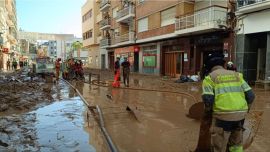Argentina’s commitment to existing environmental protections was placed under heavy scrutiny at the COP23 climate change conference this week, after Environment and Sustainable Development Minister Sergio Bergman admitted the government intends to review legislation protecting the country’s forests and glaciers.
Taking questions from the Buenos Aires Times at the UN’s climate change conference in Bonn, Germany, Bergman described the legislation as “restrictive” and called for an “open discussion” about the rules. Reports in the Argentina press this week indicated the laws would be altered, with La Nación suggesting the government will seek to find a new balance between environmental protection and “economic activity.”
Bergman headed the Argentine delegation at COP23, a summit which is working toward the implementation of the Paris Agreement signed in 2015. Quizzed by the Times at a press conference, he said both the Forest and Glacier protection laws are “restrictive and [are] addressing the problems too late.”
“We need to have an open discussion regarding forests and glaciers. Our laws don’t solve how we manage the resources. They are just trying to stop what we have already desecrated,” said Bergman. “We need to review them as they don’t have efficient mechanisms to be implemented.”
Environmentalists expressed concern over the news, with one telling the Times that any potential move to weaken the legislation would be “a clear step backwards.” Any drastic modifications to the law would be sure to meet with fierce resistance from environmental groups. The news comes at an awkward time for the government, which will take on the G20 presidency at the end of the year and is planning the group’s agenda, of which climate change is a key part.
QUESTIONS
Since its passage into law, the Forest Law has never received the amount of budget it was supposed to, a fact that has been frequently criticised by environmental organizations. Meanwhile, the inventory for the Glacier Law, which was passed in 2011, has still not been completed. The Environment Ministry aims to do so next year.
Civil society organizations attending the COP23 received the news of potential alterations with surprise and many asked the Mauricio Macri administration not to backtrack by changing the laws, after having reviewed and upgraded its climate change pledge, also known as National Intended Contribution (NDC).
“As countries seek to increase climate ambitions in Bonn to protect the ecosystems and the communities that depend on them, Macri is going in the opposite direction and seeking to weaken the Forest and Glacier Laws,” Enrique Maurtua Konstantinidis, head of climate change at Fundación Ambiente y Recursos Naturales (FARN), told the Times.
“It’s really shocking, especially considering the forward steps taken by the government on climate change. It’s a clear step backwards,” he said Following the same line of thought, Enrique Viale, the head of Argentina’s Environmental Lawyers Association, who travelled to the COP with Senator Fernando “Pino” Solanas, accused Argentina of “aiming to destroy its glaciers and forests to the favour of multinational companies.”
Argentina committed in 2016 to reduce its emissions by 18 percent unconditionally and 37 percent conditionally by 2030, improving on a previous and less ambitious pledge. Nevertheless, the goal is still considered “highly insufficient” by Climate Action Tracker, an independent organisation that tracks the commitment of countries to climate change.
Defending the government’s position at the COP23 conference, Bergman said Argentina is already “mitigating all the greenhouses gasses that it emits” and dismissed the idea of increasing its ambition on the NDC. He criticised the former government, saying the Macri administration had to “pick up the pieces” after “years of no environmental policies” during former president Cristina Fernández de Kirchner’s administration.
G20 AGENDA
Argentina will soon take over the G20 presidency from Germany and the role that climate change on the next year’s agenda was one of the key discussions at the COP23, with growing concern from environmental organisations apparent.
The Mauricio Macri administration is aiming to create a climate sustainability group, instead of having two separate groups on energy and climate, as Germany did over this past year. Argentina will seek to reach a consensus with all countries, including the United States, which under US President Donald Trump’s leadership has become the only nation from the group to reject the Paris Agreement.
“We won’t confront the position of the United States. Trump rejected the Paris Deal but not reducing emissions. It will be another player toward climate sustainability. Argentina will aim at reaching consensus at G20,” Bergman told the Times.
Patricia Espinosa, head of the United Nations Climate Change Framework Convention (UNFCCC), said she was optimistic regarding Argentina’s role. “We hope that and want Argentina to take a leadership position on climate change at G20,” Espinosa told the Times. “I’m optimistic, it can be achieved.”
That’s not the picture environmental groups saw at the COP, however. The Climate Action Network (CAN), which groups civil society organisations from across the globe, speculated in its daily newsletter ECO during the COP summit that climate change might just be “one issue among many” for Argentina at G20 and questioned the lack of certainties on the agenda that will be pushed forward by the country.
“With only three weeks remaining before Argentina officially takes on the G20 Presidency, ECO is very discouraged by this seeming lack of a clear climate focus, particularly coming from a country whose economy has so much to gain from sustainable development,” the newsletter read.
Interview with Carlos Gentile, under-secretary of climate change and sustainable development
What has been Argentina’s role at COP23?
We are here to show the progress made by Argentina on climate change. We want the tools of the Paris Deal to be used [to deliver] concrete actions. That’s why we developed sectorial plans on energy, transport and forest, which are the way to implement our climate contribution.
More than 20 percent of Argentina’s emissions come from livestock.
How do you plan on lowering them as the Macri administration openly encourages growth in the agricultural sector?
There’s a tension there and a lot [for us] to improve. It’s one of the discussions that we have to start having. The agricultural sector says that it can keep growing without expanding the surface [area used] and I believe that’s true. The livestock sector can be much more efficient for example.
What will be Argentina’s climate agenda for the G20?
We aim to create a climate sustainability group but it’s not resolved yet. Some countries want to continue having a joint group with energy and climate, while others want to divide them. What we want is to make sure that climate change is in a group, if it’s with another topic or separated, that’s not important.
Can Argentina increase its ambitions on climate change?
Yes, that’s our goal. We know we can do more than what we are doing and that’s something that we are going to achieve.

























Comments